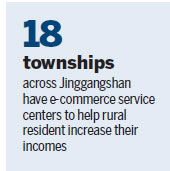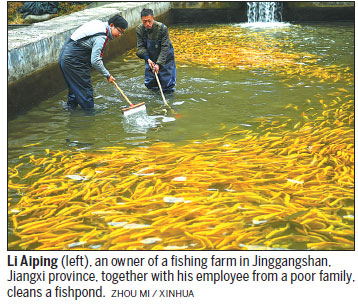Target initiatives prove effective means of aids
Jinggangshan became the first county-level economy to be removed from China's poverty area list in February. Its neighbor, Ji'an was removed from the list in October, becoming another feather in the cap of the government of Jiangxi province, which has been making great efforts to eliminate poverty in the province.
The local government leaders who are in charge of poverty alleviation work will continue to strive to improve the quality of life of poor families and increase their sense of well-being.
Jinggangshan, named after Jinggang Mountain, is known as the cradle of China's revolution. It was home to more than 16,930 people from nearly 4,640 families in 44 poor villages who were living in poverty in early 2014.
Because of its inconvenient transportation, poor infrastructure and a small economy, the area had yet to be developed.
As part of its poverty alleviation efforts, the local government invested heavily in expanding the road network.
Dec 18, 2016 was an unforgettable day for Shebei village in Mucun township, as a cement road was finally opened.
"Before the cement road, villagers had to carry cedar wood on their shoulders and back. In a day, they could ship at most half a cubic meter of wood out of the mountain," said Zou Weinan, deputy Party chief of Mucun. "After the road came into use, they can move 20 to 30 cubic meters of wood a day."
In Shenshan village of Maoping township, an expanded road system contributed to a boom in tourism and flourishing businesses of local peach and tea cooperatives.
The village is home to 54 families of whom 21 were previously living in poverty.
Huang Chengzhong, Party chief of the village, said: "Currently, 47 percent of the villagers are involved in tourism, which has helped to reduce the village's poor population to three people of two families."
Rural tourism has enabled the previously poor families to increase their incomes, with per capita income growing to 11,800 yuan ($1,780) a year, Huang said.
All villages with at least 25 households in Jinggangshan now have cement roads, are provided with tap water and have healthcare and cultural service centers.
Huang Changhui, an official at the Jinggangshan Poverty Alleviation and Resettlement Office, said: "Our poverty alleviation work needs to be targeted and can't be generalized."

After visiting villages across Jinggangshan, local officials recorded detailed information about the number of poverty-stricken inhabitants, analyzed the reasons for their poverty, and came up with specific solutions to lift them out of poverty.
Jinggangshan created a red-and-blue-card category mechanism to mark the poverty degree among poor families.
People registered on red cards are termed as impoverished and those on blue cards are categorized as poor.
The categorization helps to ensure that government policies, funds and investment projects will be used where they are needed most, local officials said.
The authorities have also established tea plantations covering 13,333 hectares, bamboo forests covering 20,000 hectares and fruit farms covering 6,667 hectares to create businesses and help poor villagers to increase their incomes.
The government also encourages local residents to do business online.

Huang Xiaohua, head of a rural e-commerce service center in Jinggangshan, said he has mailed more than 17,000 parcels worth more than 1.6 million yuan since the center began operations about a year ago.
Most of the shipments were products produced by poor local families, he added.
Such e-commerce service centers operating in 18 townships in Jinggangshan have helped nearly 2,450 poor villagers to increase their incomes.
As a historical revolutionary hub, Jinggangshan is emerging as a popular red tourism attraction and drawing an influx of visitors from around the country.
Last year alone, more than 40,000 people visited Bashang village in Maoping township to participate in a Red Army Soldier's Day experience program.
Xiao Fumin, one of the villagers, told Xinhua News Agency that his home received 850 visitors and he earned roughly 10,000 yuan in net income by providing them with accommodation in 2016.
In Ji'an, developing businesses, agricultural cooperatives and leading companies have been the key to helping to lift villagers out of poverty.
Li Xiaoming, a 45-year-old farmer in Tangli village in Ji'an, has three children and elderly parents to take care of. His wife is in poor health, so his family heavily relies on him and faces serious economic difficulties.
Since he began to receive priority support for poverty relief from the local government in 2013, he has been offered free pomelo seedlings and consultancy services for production and sales.
Each poor rural family in Ji'an is offered 30 pomelo seedlings, according to the city government. Farmers are also given free technical training in breeding and brand building.
Both Ji'an and Jinggangshan are models of successful poverty alleviation and their methods can be promoted in other regions, local officials said.
(China Daily 11/06/2017 page12)














